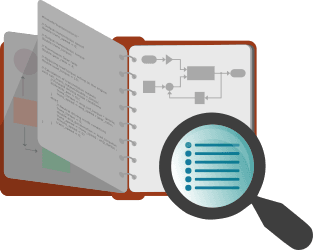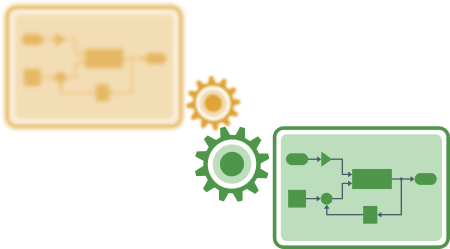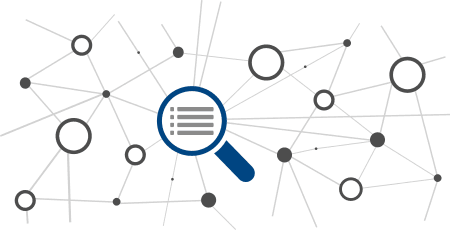
MetaDataQuest is a multi-platform search engine for Model Based Systems Engineering (MBSE). Volumes of systems knowledge present across engineering programs can be quickly searched and retrieved. It understands and extracts rich metadata about structural, physical and functional aspects of systems, helping to intelligently identify suitable control algorithms and plant models. Depending upon the native platform, it offers additional features including model refactor support for Simulink, report generation for analysis and conformance to style guides.
Legacy components modeled in various platforms including Simulink, C and Modelica can be searched as per the search specification. The components matching the search criteria can be filtered from the results and reused in new engineering projects. Thus, MetaDataQuest helps to reuse validated components, reduce development effort and thereby, save project cost.
Along with MetaDataCloud enterprise platform, MetaDataQuest helps to organize milestone releases of engineering projects across teams and perform faster search and retrieval of systems in real time.

Default search feature available in native platforms are limited to identify models and components based on their names. There is a need to intepret rich knowledge inside the engineering systems so that all engineers know about structural, physical and functional aspects of systems.
MetaDataQuest can understand the detailed semantics of engineering systems implemented in various native platforms, extract suitable metadata and organize them efficiently for intelligent search and easy retrieval of systems of interest in real time.

During model review, various aspects inside Simulink models including component names and parameters have to be updated as per the guidelines. Such effort through manual modification or custom Matlab scripting can be time consuming and prone to quality issues for critical real time systems.
Using MetaDataQuest, engineers can quickly search for systems to be updated, specify the relevant change and perform quick refactoring of all Simulink models in the entire project repository. Further, it can help to migrate older library blocksets inside the models to their latest versions.

Various aspects of complex systems will be familiar to team members during the project execution. After the completion, such knowledge about systems will be difficult to remember. Further, there is no easy way to know about existence of such systems across engineering teams.
Systems Engineers can choose these existing project repositories in MetaDataQuest and search for legacy components. Validated components can be retrieved and reused in new projects helping to avoid duplication of existing systems, reduce development effort and save project cost.

MetaDataQuest can search within a single model, across workspaces and project repositories. In addition, it is integrated with MetaDataCloud application, which helps to perform enterprise cloud search across engineering teams and projects.
Milestone releases of engineering projects can be pushed to the MetaDataCloud by automatic metadata extraction from these systems. Real-time seach and retrieval can be performed over such large volume of systems knowledge base quickly.

Seamless support for searching of engineering systems modeled in various native platforms including C, Matlab-Simulink and Modelica. More platforms and knowledge systems will be integrated to provide complete systems knowledge for Model Based System Engineering.
The search specification and workflow are unique for each native platform. The search filter is easy to use and powerful to specify complex search criteria for identification of Systems of Interest.

Typically, the development teams have their own coding standards and modeling guidelines. The systems have to be checked for conformance to these standards. Often, this results in development of in-house tools and custom scripts for automated checking and reports creation.
MetaDataQuest has powerful parser and search engine which helps in thorough checking of large systems as per the guidelines and ensure the conformance of products releases to industry standards.

Intelligent search and recognition of Systems of Interest from models/embedded code based on detailed metadata extracted from internal components.

Seamless support for searching of engineering systems implemented in various native platforms including C, Matlab-Simulink and Modelica.

Unique search filter for each native platform which is easy to use and powerful to specify complex search criteria for identification of Systems of Interest.

Customizable filter to search within a single model or across local workspace, project repositories and corporate knowledge base.

Optimized for efficient processing of large volume of models/embedded code and faster retrieval of ready-to-use components in real time.

Search specifications can be saved, reused and shared with the team members for quick identification of components matching the criteria.

Easy filtering of searched components based on specific types of blocks, libraries and projects through automatic filter enabled on results.

Facility to push metaData extracted from milestone releases of the engineering models/code to cloud platforms for creation of systems knowledge base.

Feature to connect with MetaDataCloud Enterprise Platform for searching and reusing of legacy components across engineering teams/projects.

Flexible customization of search process, metadata extraction, source repositories and native editors depending upon the target platform.

Facility to filter and export components matching the search criteria in a customizable format including as XML and HTML reports.

Open APIs are available for integration with third party and in-house tools for automation of metadata based search and component identification.

Intuitive workflow for Name based search and retrieval of subsystems, blocks, ports, parameters and other artifacts in Simulink models.

Unique workflow for searching of suitable components from Simulink model repositories based on template specifications and feature constraints.

Progressive searching of Simulink models through Quick Search feature, helping to sequentially iterate through matching components.

Search specification for Simulink models can be filtered to search only blocks, subsystems, ports, parameters, signals, documentation and certain types of blocks.

Blocks, ports and signals matching search criteria can be refactored as per the style guide. Also, parameter values and documentation can be updated.

Powerful engine to find parameters used in models and correct them to new values in all the places where they are referred with a single-click.

Easy to fix missing library links in models, change library references and migrate old blocks to their new versions in custom Simulink block sets.

Detailed metadata and physical properties of Simulink models organized in Cloud platform can be searched in real time for component reusability.

Simultaneously launchable via context menu in Simulink and as standalone Windows application with option to launch Matlab and initialize search path & workspace.

Intuitive workflow for search & retrieval of C code artifacts such as functions, variables, macros, typedefs and documentation based on template specifications.

Intelligent logic tracing and analysis of usage context of constructs, helping to perform semantic queries like search for functions accessing/modifying variables.

Powerful C parser which can handle preprocessor constructs, search across configurations and show conditions under which constructs will be active.

Intelligent identification of coding conventions through customization options like use of getter/setter methods, ignored constructs and documentation format.

Workflow support for analysis of entire project code base and generation of reports in various formats. Know more about usecases.

Support for integration with various native code editors with provision to open C/H files in the associated editors and highlight the matching constructs.
Thanks for choosing to evaluate our product. Kindly tell us about yourself and the purpose of the evaluation to serve you better.